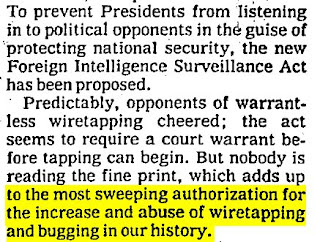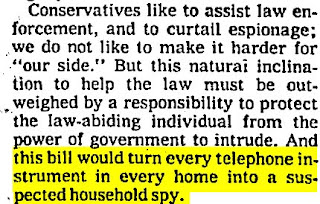It's periodically worthwhile to take note of just how far to the Right our political establishment has shifted over the last couple of decades, and few issues reveal that shift as clearly as the debate over warrantless government spying. The absolute most "liberal" viewpoint that can be expressed is that the FISA court is a wonderful and important safeguard on civil liberties and that it strikes the perfect balance between freedom and security.
But for decades, the FISA court -- for obvious reasons -- was considered to be one of the great threats to civil liberties, the very antithesis of how an open, democratic system of government ought to function. The FISA court was long the symbol of how severe are the incursions we've allowed into basic civil liberties and open government.
The FISC is a classically Kafka-esque court that operates in total secrecy. Only the Government, and nobody else, is permitted to attend, participate, and make arguments. Only the Government is permitted to access or know about the decisions issued by that court. Rather than the judges being assigned randomly and therefore fairly, they are hand-picked by the Chief Justice (who has been a GOP-appointee since FISA was enacted) and are uniformly the types of judges who evince great deference to the Government. As a result, the FISA court has been notorious for decades for mindlessly rubber-stamping every single Government request to eavesdrop on whomever they want. Just look at this chart (h/t Arthur Silber) for the full, absurd picture.
Yet now, embracing this secret, one-sided, slavishly pro-government court defines the outermost liberal or "pro-civil-liberty" view permitted in our public discourse. And indeed, as reports of imminent (and entirely predictable) House Democratic capitulation on the FISA bill emerge, the FISA court is now actually deemed by the establishment to be too far to the Left -- too much of a restraint on our increasingly omnipotent surveillance state. Anyone who believes that we should at the very least have those extremely minimal -- really just symbolic -- limitations on our Government's ability to spy on us in secret is now a far Leftist.
But it was not always so. When FISA was first unveiled at the height of the Cold War, it was publicly supported by what a May 23, 1977, pro-FISA Washington Post Editorial described as "leaders of the intelligence community and Congress." Upon passage of FISA, a 1978 World News Digest article reported (via LEXIS): "All of the U.S. intelligence agencies [including the CIA and NSA] were on record in favor of the final bill." And in the wake of revelations of decades of eavesdropping abuses, FISA was supported both by the Carter and Ford administrations. It passed the Senate by voice vote.
But opposition to FISA -- in many civil libertarian and even conservative circles -- was fierce, not on the ground that it imposed too many restrictions on Government eavesdropping but on the opposite ground: that FISA gave legal sanction to sweeping, excessive, unchecked government power to spy on Americans. Here is what William Safire wrote on June 26, 1978 in his New York Times column opposing FISA, largely on the grounds that by requiring phone companies to cooperate with government spying, FISA transformed the telecom industry into an arm of the police state: . . . .
. . . . 

Even more revealingly, the telecoms themselves -- now the most eager co-conspirators in broader government surveillance powers -- were back then among the most vocal opponents of FISA, as they objected to the provisions which required them to participate in Government spying and thus forced them to violate the privacy rights of their own customers. From a June 27, 1978 Washington Post article headlined: "AT&T Hits Wider Role in Wiretaps; Ma Bell Shuns Wider Wiretap Role":
Ma Bell could become simply a slave for Big Brother under a little noted section of important foreign intelligence surveillance legislation being considered by Congress.At issue is basic privacy of telephone communications. A business and service for which American Telephone & Telegraph Co. has had a virtual nationwide monopoly over the past century.
Despite cases in recent years that have involved sometimes illegal telephone wiretapping, AT&T long has emphasized privacy as "a basic concept" of its business.
"We believe our customers have an inherent right to use the telephone with the same privacy they enjoy when talking face to face," states company policy. . . .
In the wake of Watergate, it has been difficult to find company employees who would violate AT&T policy. And some members of Congress have been convinced that telephone companies should be ordered to play a more active role.
As a result, provisions have been added to the proposed Foreign Intelligence Surveillance Act that would allow courts and federal officials to require that AT&T become the wiretapper of the future.
(FISA, and its successor Protect America Act, both require telecoms to comply with government requests to allow surveillance where there is a requisite court order or government certification of legality, which is why the claim that telecoms won't cooperate without retroactive immunity is so deceitful).
Or consider the role which the Washington Post Editorial Board -- currently one of the most vocal advocates of greater surveillance state powers and telecom amnesty -- used to play in these debates, from a September 14, 1978 Editorial urging the passage of FISA:
The disclosures in recent years of the activities of the FBI demonstrate the danger of leaving such unbridled discretion in the executive branch. While some of the wiretaps, mail covers and burglaries that were undertaken against American citizens and organizations in the name of national security had legitimate goals, many clearly did not. Some were undertaken solely because a high official wanted to know about the personal life of a particular individual or because he was upset by a particular news story.The proposed legislation would put a stop to abuses of that kind without hampering legitimate national security investigations. It would simply put an impartial arbitrator -- in the person of a judge -- between every citizen's privacy and the desire of the government to penetrate it. That would not be a new role for federal judges, they served constantly as buffers between the government and the individual. But it would provide a new kind of protection that events of the recent past have shown is sorely needed.
Back then, the premise that unchecked presidential spying would lead to massive abuses -- as it did for decades -- was just a given, something beyond the realm of what could be reasonably debated. Now, only far Left partisans worry about such silly things.
Even back then, of course, there were the hysterical fear-mongerers who argued that we would all be subjugated and slaughtered by The Terrorists The Communists if we imposed oversight on presidential spying, but -- unlike today, when that mentality dominates our political establishment -- it was, back then, a small and irrelevant fringe. From an April 17, 1978 Associated Press report:
The key committee vote was on an amendment offered by Rep. Robert McClory's belief that the president has inherent constitutional powers to authorize foreign intelligence surveillance and that the courts should not become involved in this areas.McClory proposed to grant the attorney general and the president's national security advisor the power to sign surveillance certificates which would authorize wiretaps, eavesdroppings or the like. If an American citizen was involved in the probe, the president's authorization would also be required.
This approach was turned down on a 6 to 3 vote. Most committee members said they preferred a plan setting up a rotating board of federal judges to approve surveillance activities.
The committee also rejected McClory's suggestions that authorizations be required for cases involving U.S. citizens or persons with legal status in the United States. The committee decided that clearance must be sought in all cases where surveillance is contemplated.
Back then -- with a relentless, ideologically extreme Evil Empire threatening our very existence and our freedoms -- GOP fear-mongering was brushed aside. The political establishment overwhelmingly concluded that warrantless eavesdropping presented intolerable dangers, and many believed that FISA's "safeguards" were actually woefully inadequate. Telecoms lobbied on behalf of their customers' privacy rights and against being drawn into government surveillance. Editorial boards were almost unanimously on the side of greater oversight on presidential spying.
That all seems so quaint. The mindset which back then defined the radical, pro-surveillance right-wing fringe has now become the sweet spot of our political establishment. The GOP fear-mongering that back then was laughed away today dominates our discourse and shapes our laws. The secret FISA court which back then was viewed even by some conservatives as an extreme threat to civil liberties is now the outermost liberal viewpoint, one that is about to be ejected altogether by the Democratic Congress from the mainstream spectrum. The political establishment today knows only one viewpoint: literally no limits are tolerable on the power of the loving, protective Surveillance State.



Shares